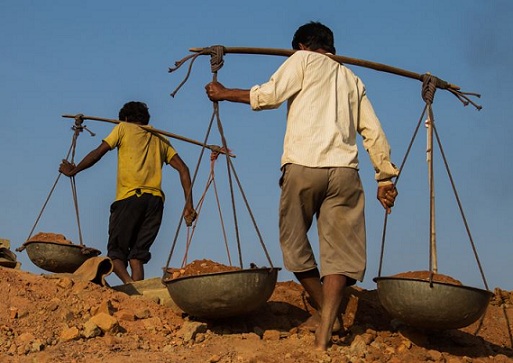The risks of the use of forced labour in global supply chains supporting the rise of renewable energy and energy storage, include mining and processing of minerals, were discussed at an exclusive briefing session hosted by FIDIC and attended by the World Bank on 11 May 2022, writes FIDIC communications advisor Andy Walker.
The discussion was part of an additional panel session which took place during day one of the Official FIDIC Contract Users’ Conference (Africa and Middle East time zone event) entitled “Managing risks of forced labour in the global supply chain for energy transition” and chaired by FIDIC CEO Dr Nelson Ogunshakin.
A knowledgeable panel of speakers was assembled to discuss this key issue which included Enzo de Laurentiis, chief procurement officer at the World Bank, Philip Napier-Moore, energy sector leader, ASEAN and East Asia at Mott MacDonald, Husni Madi, chief executive officer of Shura Construction Management, Tim de Meyer, senior adviser on international labour at the International Labour Organisation and Daduna Kokhreidze, general counsel at FIDIC.
Panellists discussed the issues around forced labour arising in the renewable energy supply chain and ongoing industry efforts to mitigate those risks which would protect workers globally supporting the energy transition.
Enzo de Laurentiis, chief procurement officer at the World Bank, confirmed that there was an absolute and total prohibition on the use of forced labour on the bank’s projects. “This is a very serious issue and we have made a very firm commitment on it,” said Laurentiis. “We have strengthened provisions in our contracts by including forced labour bidder declarations, qualification requirements and strengthened contractual provision in procurement,” he said. Laurentiis reported that the World Bank had also recently enhanced its standard procurement documents to require its borrowers to strengthen procurements involving solar panels/solar components.
Laurentiis also said that World Bank was very keen to collaborate with the industry and its representative bodies to mitigate the risks around forced labour in global supply chains supporting the rise of renewable energy and energy storage projects.
Philip Napier-Moore, energy sector leader, ASEAN and East Asia at Mott MacDonald, highlighted the scope of the supply chains involved in the solar sector and said he was addressing the issue from a health and safety perspective. “Forced labour issues in the renewable energy supply chain have been relatively ignored in the past and the weak points tend to be way down the supply chain,” said Naper-Moore. The industry has acted but there was a need for more tailored guidance and information and a structured approach to help drive change down through the supply chain, he said.
Husni Madi, chief executive officer of Shura Construction Management, talked about some of the relevant clauses in FIDIC contracts that provided an opportunity to address the issue of forced labour. “In most countries forced labour is prohibited but there are some loopholes. Our duty is to ensure that our contracts support the prevention of forced labour being used by suppliers and/or contractors when working with FIDIC forms,” said Madi. He pointed to clauses in the FIDIC contracts that stipulated that conditions of labour should comply with all applicable laws, including labour laws and said that these clauses would help close loopholes that were used by unscrupulous organisations.
Tim de Meyer, senior adviser on international labour at the International Labour Organization (ILO), congratulated the energy sector for looking at ways of pushing a “just transition” to a low carbon economy and for levering procurement to combat forced labour. He said that before “weeding out risk” it was important to know what you were looking for. “Forced labour manifests itself in many different ways and supply chains can be affected differently too,” de Meyer said. He explained that the ILO had a number of conventions and instruments outlawing forced labour and these had been adopted by most nations around the globe. “These standards are part of international public law, so they don’t address business or procurement law,” he said. He also made the point that being paid “compensation” (a wage) did not necessarily rule out forced labour taking place and this needed to be considered, so he urged attendees at the event to make themselves aware of the ILO’s conventions.
There was also “a social floor to globalisation”, de Meyer said, that needed to be considered and this was something that the ILO was keen to promote. He also advised his audience to be careful when working with countries that use a lot of migrant or bonded labour when working with supply chains and he pointed to the ILOs website which contained much information and indicators on how to spot the risks of the use of forced labour in the renewable energy sector.
Daduna Kokhreidze, general counsel at FIDIC, said that it was important for all stakeholders to engage on these important issues and FIDIC was keen to play its part in raising awareness across the industry of the scourge of forced labour and that this would continue in the future.
Enzo de Laurentiis said that it was important to educate people and work together to combat the issue of forced labour. “We need to get everyone on board and come together as an entire industry,” he said.
Summing up the session, FIDIC CEO Dr Nelson Ogunshakin said that the industry needed to gather all stakeholders around the table to address this crucial issue. “FIDIC is really pleased to have been able to provide a platform today for the industry to discuss the crucial issues around forced labour and how to combat this scourge. Rest assured that we will continue to do so and do all we can to raise awareness across the global construction and infrastructure sector,” he said.
Day two of the Official FIDIC Contract Users’ Conference (Africa and Middle East time zone event) continues on Thursday 12 May 2022 starting at 10am CET. Click here for details of the conference, including registration information.







